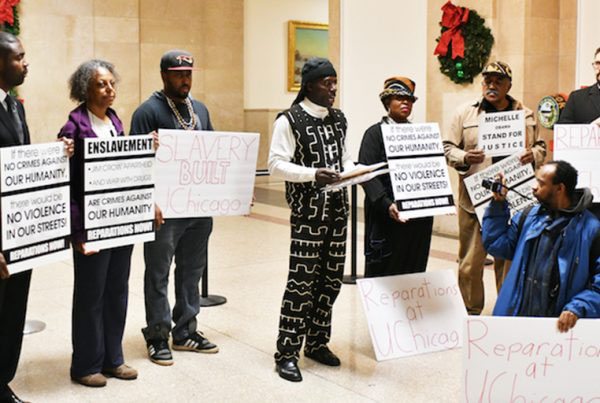
November 30, 2017; Chicago Maroon
As reported by the Chicago Maroon, the University of Chicago’s independent student newspaper, the National Coalition of Blacks for Reparations in American (N’COBRA)— along with the Reparations at UChicago Working Group (RAUC) and some campus student groups—held a rally on November 28th and delivered an open letter to the university, Chicago Mayor Rahm Emanuel, and Barack and Michelle Obama “demanding reparatory justice.”
Their position is that the university was established with profits from a slave plantation by Illinois politician Stephen Douglas in 1856. Douglas was also the president of the old university’s board of trustees. The present University of Chicago campus was founded in 1890. But there was a previous Bronzeville campus that was established in 1856 and which operated until going bankrupt three decades later.
RAUC produced a paper in May that outlines the original slave connection. “The University of Chicago is founded by slaveholders and the labor of enslaved people can actually be traced through the years,” said coauthor of the paper and teaching fellow in the social sciences, Guy Emerson Mount. “The labor of enslaved people actually translates into buildings, endowments, and real hard material resources.” As further evidence, the paper “cites Dean of the College John Boyer, who states in The University of Chicago: A History that the Hyde Park and Bronzeville campuses shared an overlapping network of donors and faculty.”
Chicago’s 2002 Slavery Era Disclosure Ordinance requires that any organization contracting with the city must document any pertinent historical information pertaining to slaveholding. University of Chicago, RAUC says, has not done this.
The university dates its founding from 1890, 25 years after the end of the Civil War, and the first classes were held in the fall of 1892. The Maroon reports that a University of Chicago spokesman said that “the current University of Chicago, founded in 1890, had no financial or legal relationship with the ‘first’ University of Chicago, which was founded in 1856–57 and collapsed in 1886 in a state of debt and foreclosure.”
On the face of it, it appears the school has divorced itself from its first iteration due to the slaveholder history. But, if the past university donor system was anything like it is today, the people that laid down some new money wanted their name associated with starting a new school, not restructuring a failed one. The donor names for the school that began in 1890 included John D. Rockefeller, oil magnate; the American Baptist Education Society; and Marshall Fields, the retail giant that donated the land in Hyde Park.
Sign up for our free newsletters
Subscribe to NPQ's newsletters to have our top stories delivered directly to your inbox.
By signing up, you agree to our privacy policy and terms of use, and to receive messages from NPQ and our partners.
The timing of the rally and open letter is due to the university’s involvement with the Obama Presidential Center being built in Jackson Park. The organizers want a permanent community benefits agreement (CBA) that includes the entire Hyde Park community in any changes and developments that happen as a means towards slave reparations. The CBA becomes a contract with any developer that provides delineated benefits to the community. This goes much further than the ordinance, which only requires reporting the information—a level of transparency. It does not require reparations.
NPQ has regularly covered the case of reparations in the academic world. Each case is unique. N’COBRA and the others would like reparations to occur in the whole community, not just for students and on campus.
Mount stated that a “permanent CBA would mean the community shouldn’t have to fight this fight every time something’s getting built.”
“The CBA is about bringing together community groups that have the right to not be kicked out of their neighborhoods,” said fourth-year and UC for a CBA member Robert Hayes. “It’s a step to right the wrongs they’ve done to the community throughout history.”
In their open letter, the RAUC and N’COBRA demanded that the University “establish a truth and reconciliation committee that would produce a comprehensive reparations program,” as well as change their establishment year to that of the former campus.
Kamm Howard, National Male Co-Chair of N’COBRA, told the Maroon, “The University has played a role in changing the racial structure of not only Hyde Park but the Woodlawn community.… Historically, a lot of black wealth was built in this area, and that’s being totally usurped…. We would like to see things like more affordable housing to prevent that.”
With the slavery ordinance as their leverage, the activist groups are requesting the city stop any current and future contracts with the University of Chicago until they achieve their demands. Existing contracts between the University and the City of Chicago include a contract for the University of Chicago Police Department (UCPD). Mount does not see cancelling the police contract as a danger to students, or even a negative, “The police patrol a parameter designed to keep people out rather than in,” he said. “This is an opportunity to have its contract cancelled.”—Marian Conway













